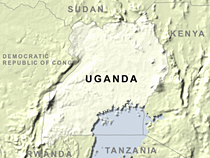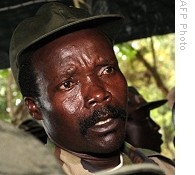VOA标准英语10月-Uganda Ready to Join UN Security Council(在线收听)
 Uganda is set to fill the seat currently held by South Africa. The appointment, which begins on January 1, would last for two years.
Uganda is set to fill the seat currently held by South Africa. The appointment, which begins on January 1, would last for two years. As the only candidate for the seat, which is reserved for an African country, Uganda is virtually assured of the position.
Ugandan diplomatic officials have suggested the country will use its position on the council to put increased pressure on the Lord's Resistance Army rebel group. The government and the rebels have been in peace talks for the past two years.
Negotiators reached an agreement earlier this year, but rebel leader Joseph Kony has failed to sign the agreement, and the Ugandan government has expressed growing frustration with the process.
In recent years, the rebel group has been most active in the Democratic Republic of the Congo and southern Sudan, and Uganda has been in discussions with the governments of those countries about the possibility of launching a military operation against the rebels.
At the Security Council, Uganda may push to expand the mandates of MONUC, the U.N. peacekeeping mission in the Congo, and of UNMIS, the mission in southern Sudan, to allow them to go after the Lord's Resistance Army.
Researcher Xavier Ejoyi, of the Institute for Security Studies in Nairobi, says the continued rebel activity and the recent resurgence of fighting in eastern Congo, near the border with Uganda, mean Uganda will likely push to give the region a higher profile at the Security Council.
"Any situation that poses a threat to the security of that region, because the countries there are so interlinked, will definitely be a security threat to Uganda," he said. "If that threat continues, I think it may be possible that it could bring up an issue on the MONUC's role in the DRC, as to whether it should broaden its mandate to cover other aspects, ie the LRA or many other issues."
 |
| Joseph Kony (2006 file photo) |
Kony and his top deputies are also wanted by the International Criminal Court, and the indictments have been cited as a major reason that Kony has refused to approve a peace deal.
Ejoyi says Uganda may push for the U.N. security council to drop the arrest warrants, if it allowed for a peace agreement.
"Uganda seems to be willing to withdraw the charges against the LRA if it is within its power to do so after the LRA leadership signs the peace agreement," said Ejoyi. "Now we will see whether that is an issue that will be pursued further within the its term of tenure within the U.N. Security Council. Whether it will convince other members of the U.N. Security Council to drop charges is what remains to be seen."
Ejoyi says Uganda may also attempt to push for an expanded role for the United Nations in Somalia, where Uganda currently supplies the bulk of the roughly 3,000-troop African Union peacekeeping force. Fewer than half of the 8,000 troops approved for the force have been deployed, and the mission has had little success in stemming the conflict. The African Union has asked the United Nations to take over responsibility for peacekeeping in Somalia, but it has shown little interest in doing so.
The U.N. General Assembly is set to vote on five new members for the Security Council on Friday. Most controversially, Iran is competing with Japan for a seat reserved for Asia. Mexico, Turkey, and either Iceland or Austria, are also expected to be chosen for two-year terms.